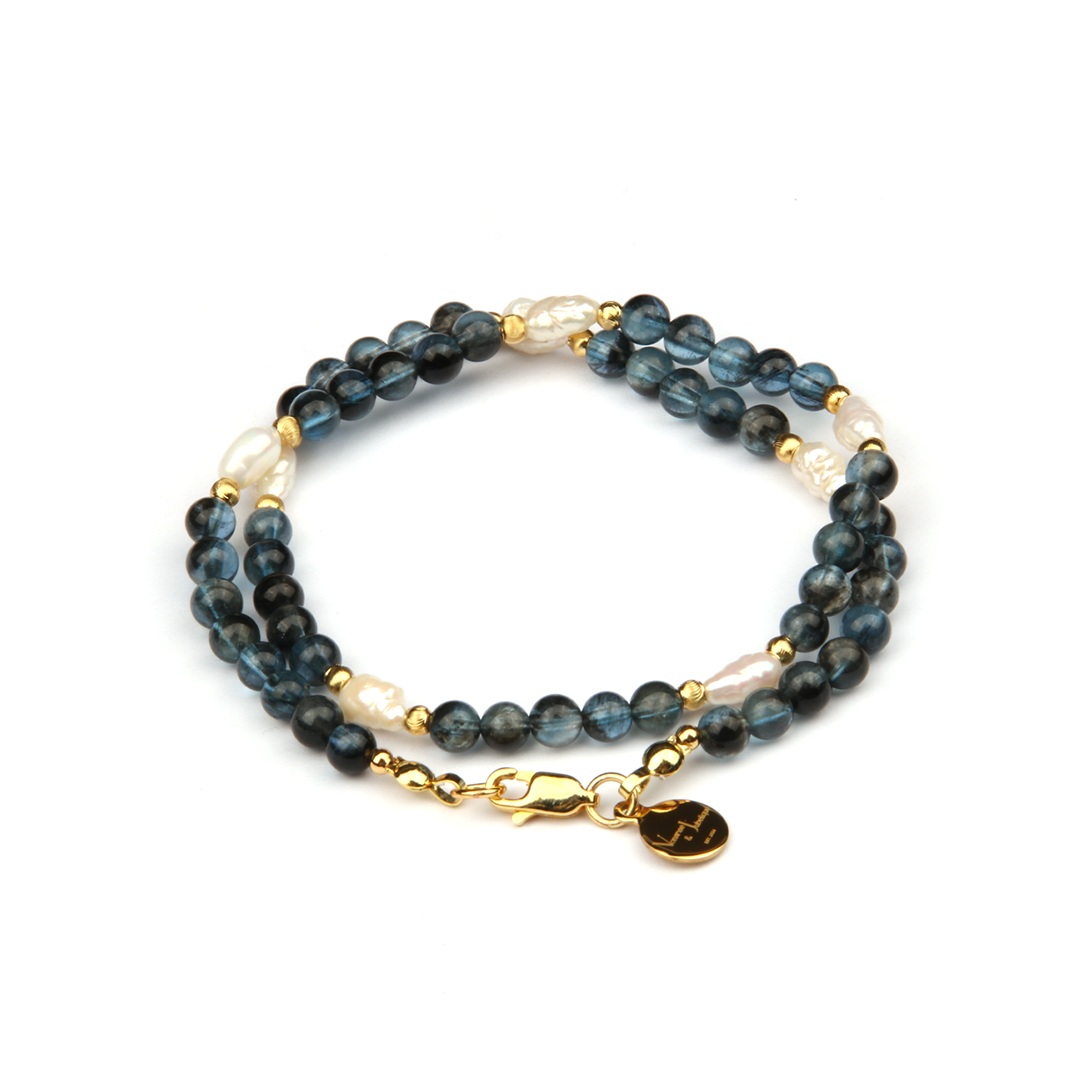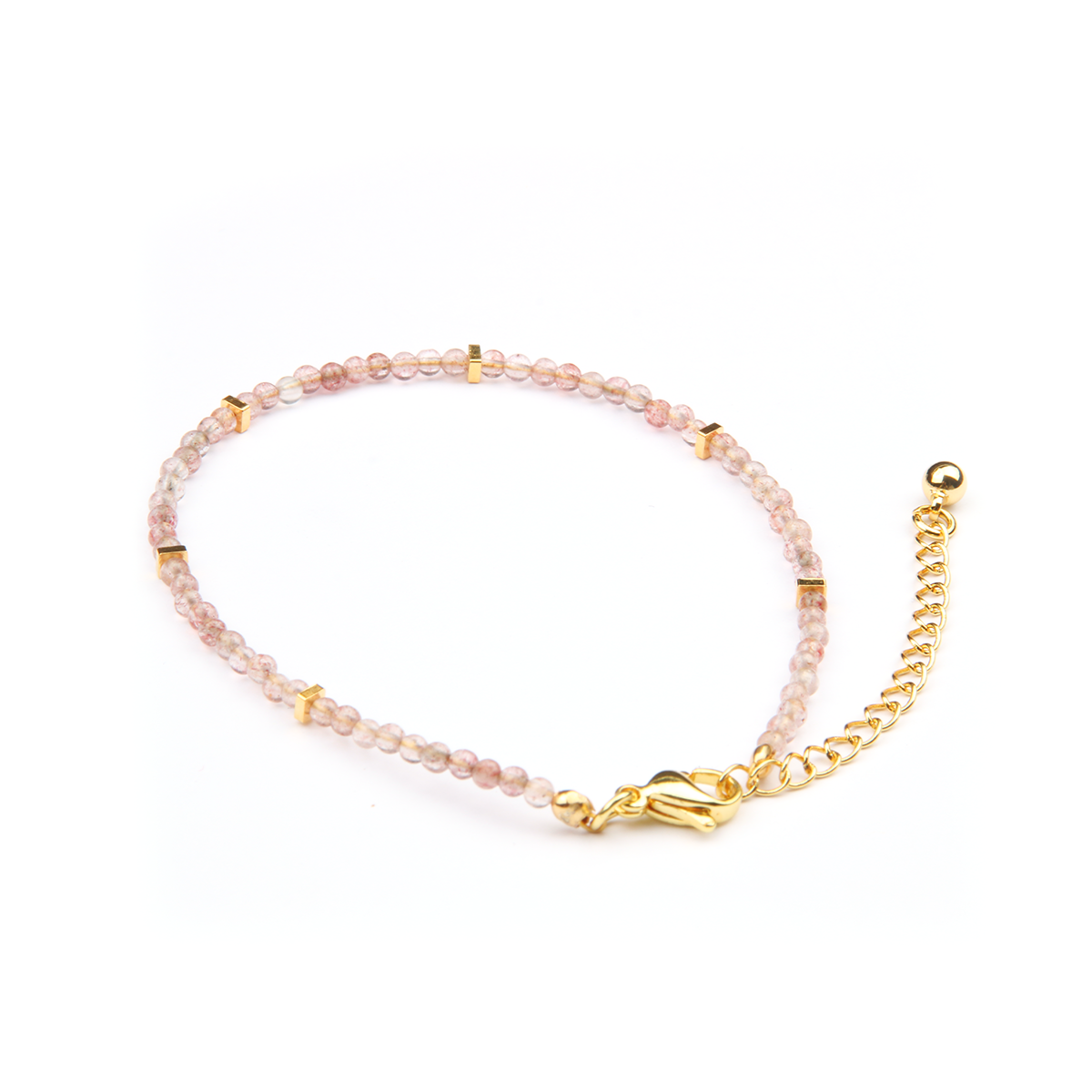Labradorite
The Mystical Gemstone of Transformation
Labradorite is a mesmerizing feldspar mineral known for its iridescent play of colors, often appearing in flashes of blue, green, gold, and even violet. This unique phenomenon is called labradorescence and makes every piece truly one of a kind.
In this guide, we’ll explore labradorite’s origins, formation, cultural significance, value, styling tips, gemstone pairings, color inspirations, and more.
Origin of Labradorite
Labradorite was first discovered in Labrador, Canada, in 1770, which is how it got its name. Today, it is sourced from multiple locations worldwide, including:
-
Canada – Produces high-quality, dark-base labradorite with vibrant flashes.
-
Madagascar – Known for rainbow-colored specimens with intense iridescence.
-
Finland – Home to Spectrolite, a rare variety with a full spectrum of colors.
-
Russia – Yields golden and blue-flash labradorite.
-
USA (Oregon) – Produces transparent, sunstone-like labradorite with copper inclusions.
The finest Spectrolite from Finland is considered the most valuable due to its exceptional color play.
Physical Characteristics
-
Color: Dark gray to black with multicolored flashes
-
Hardness: 6–6.5 on the Mohs scale
-
Structure: Triclinic crystal system
-
Special Feature: Labradorescence (optical glow caused by light refraction)
Different Types and Colors of Labradorite
Labradorite can display a range of optical flashes, each with slightly different vibrational qualities:
-
Blue Labradorite – Enhances communication and intuition
-
Green Labradorite – Aids in emotional healing and balance
-
Golden Labradorite – Stimulates creativity and personal power
-
Rainbow Labradorite – Opens all chakras and promotes multi-dimensional awareness
Labradorite vs Moonstone vs Opalite
| Crystal | Energy | Uses |
|---|---|---|
| Labradorite | Magic, protection, intuition | Transformation, shielding, psychic development |
| Moonstone | Feminine energy, cycles | Emotional healing, nurturing, intuition |
| Opalite (glass) | Calming (synthetic) | Aesthetic appeal, gentle energy |
Labradorite is natural and powerful, while Opalite is manmade and lacks the same metaphysical depth.
Formation Process of Labradorite
Labradorite is a variety of feldspar, forming in igneous rocks like basalt and gabbro.
Formation Process:
-
Molten rock (magma) cools slowly, allowing feldspar crystals to form.
-
The crystal structure develops thin, layered fractures that reflect light at different angles.
-
These layers create labradorescence, producing the stone’s signature color play.
Labradorite’s internal structure diffracts light, making it appear as if it’s glowing from within—a quality that adds to its otherworldly allure.
Cultural Significance and Meaning of Labradorite
Labradorite has long been associated with magic, intuition, and transformation.
-
Mystical Protection – Ancient Inuit legends say labradorite is the frozen fire of the Northern Lights, holding cosmic energy within.
-
Stone of Transformation – Believed to aid in personal growth and spiritual awakening.
-
Enhancing Intuition – Used by shamans and healers to strengthen psychic abilities and inner vision.
-
Emotional Balance – Thought to help stabilize emotions and protect against negative energy.
- In metaphysical circles, it is regarded as a protector of the aura, and a stone that awakens intuitive wisdom and spiritual insight.
Labradorite is often used in meditation, chakra healing, and spiritual work, making it a favorite among crystal enthusiasts and energy workers.
Labradorite in Crystal Healing and Reiki
Healing Past Wounds
Labradorite is ideal for uncovering and gently releasing emotional wounds from the past. Reiki practitioners often use it during sessions to:
-
Balance emotional imbalances
-
Stimulate cellular healing
-
Align the aura with the chakras
Energy Balance Practices
Its high frequency makes it excellent for clearing stagnant or blocked energy, especially in the upper chakras, helping restore mental peace and spiritual clarity.
Market Price and Rarity
Labradorite is relatively abundant but varies in quality, which affects its price.
-
Price Range: Typically $5 to $50 per carat, with rare, high-quality pieces reaching $100+ per carat.
-
Spectrolite (Finland): The most valuable type due to its vivid, full-spectrum flashes.
-
Common vs. Rare Colors:
-
Blue & green flashes – Common and affordable.
-
Gold & orange flashes – Less common and more expensive.
-
Purple, pink, and red flashes – The rarest and most sought-after.
-
Due to its dazzling visual effect and unique light play, labradorite remains highly desirable in both jewelry and metaphysical markets.
Labradorite Properties
Labradorite is known as the Stone of Magic, deeply connected to spiritual awakening, psychic abilities, and inner transformation. It is thought to unlock the veil between the physical and mystical realms, allowing access to one’s deeper self and spiritual truths.
Labradorite activates higher consciousness and enhances connection to your soul’s purpose. It awakens latent psychic abilities, including clairvoyance, telepathy, and astral travel. This stone is known for its powerful protective qualities. It forms a shield around the aura, deflecting unwanted energies and preventing energy leakage during spiritual work.
Labradorite strongly resonates with the Third Eye Chakra, heightening intuition, spiritual vision, and inner awareness. It also connects to the Crown Chakra, opening pathways to cosmic understanding and spiritual ascension. By strengthening inner vision, Labradorite helps users see situations more clearly—both spiritually and emotionally. It encourages deep reflection and spiritual self-trust. This crystal calms an overactive mind and balances mood swings, making it ideal for empaths, creatives, and anyone dealing with emotional fatigue.
External
Career & Success
Career Success
Relationships & Communication
Social Connectivity
Inner
Resolution
Composure
Calmness
Harmony
Virgo
Initiation
Zodiac



Element

Chakras







Planet



Mohs Hardness
6-6.5
Click to copy the Labradorite properties
Jewelry Uses and Fashion Tips
Labradorite is a powerful meditation companion. Holding the stone or placing it on your Third Eye during meditation can:
-
Deepen your focus
-
Enhance intuitive visions
-
Promote a calm, clear mind
Its radiant flashes of light serve as a visual anchor, helping you tune into your inner world more effectively.
Best Jewelry Styles:
Wearing Labradorite close to the skin is one of the best ways to benefit from its energy. Common jewelry forms include:
-
Statement Rings – Enhance decision-making and energy flow-Showcases labradorite’s iridescent beauty up close.
-
Pendant Necklaces – Close to the heart and throat chakras-Enhances its mystical glow with movement.
-
Beaded Bracelets – Great for daily grounding and intuition.
-
Earrings – Reflects light beautifully when worn near the face.
Fashion Styling Tips:
-
Boho-Chic – Pair labradorite with earthy fabrics, flowing dresses, and layered jewelry.
-
Modern Elegance – Wear with black, navy, or jewel tones to highlight its glow.
-
Edgy & Mysterious – Combine with leather, silver, and dark gemstones for an alternative aesthetic.
Its neutral yet mystical look makes it versatile for everyday wear or special occasions.
Pairing Labradorite with Other Gemstones or Materials
Complementary Gemstones:
| Gemstone | Why It Pairs Well with Labradorite |
|---|---|
| Moonstone | Enhances labradorite’s mystical and ethereal qualities. |
| Black Tourmaline | Strengthens protection and grounding properties. |
| Amethyst | Deepens spiritual awareness and intuition. |
| Citrine | Adds a warm contrast to labradorite’s cool tones. |
| Aquamarine | Complements labradorite’s ocean-like hues. |





Best Metal & Material Pairings:
-
Sterling Silver & White Gold – Highlights labradorite’s cool, cosmic glow.
- Wood – Perfect for bohemian and nature-inspired designs.



These pairings create aesthetic harmony, enhancing labradorite’s natural allure.
Crystal Color Palettes for Artistic and Fashion Inspiration
Labradorite’s iridescent hues inspire art, fashion, and interior design. Here are five color palettes based on its natural beauty:

- #1B3A5E Deep Ocean Blue – Reflects labradorite’s mystical blue flashes.
- #01796F Emerald Green – Represents its vibrant green highlights.
- #DAA520 Golden Amber – Inspired by rare golden labradorite.
- #4A4A4A Shadow Gray – A base color that complements labradorite’s dark matrix.
- #663399 Cosmic Violet – Echoes its occasional purple iridescence.
These colors enhance jewelry designs, fashion accessories, and artistic creations.
How to Spot Real Labradorite
Authenticity Checks
-
Look for labradorescence: The signature glow that shifts in the light
-
Natural imperfections: Real stones may have small cracks or irregularities
-
Weight and temperature: Genuine Labradorite feels cool and heavier than glass
Common Fakes
Some glass or dyed stones are passed off as Labradorite. Avoid overly smooth, symmetrical pieces with no color shift or reflection.
FAQs About Labradorite
Q1: What is Labradorite good for spiritually?
It enhances intuition, shields the aura, and supports spiritual transformation and insight.
Q2: Can Labradorite protect against negative energy?
Yes, it’s known as a strong protective stone that repels unwanted influences.
Q3: Is Labradorite okay for everyday wear?
Absolutely! Wearing Labradorite daily helps maintain spiritual balance and clarity.
Q4: Can I sleep with Labradorite?
Yes. Place it near your bed or under your pillow to enhance dreams and intuition.
Q5: Is Labradorite associated with any chakras?
Primarily the Third Eye and Crown Chakras, where it opens spiritual vision and connects you to divine guidance.
Q6: What’s the difference between real Labradorite and fake?
Genuine Labradorite displays labradorescence—a natural flash of color. Fakes often look too perfect and lack optical shimmer.
Labradorite is often called the “Stone of Magic” due to its legendary association with intuition and transformation. If labradorite is truly a magical stone, what mystical power would you want it to unlock for you?
Share your thoughts in the comments!







Share:
Lapis lazuli Gemstone Guide: Properties, Rarity, Pricing, Jewelry Uses & Stylish Tips
Malachite Gemstone Guide: Properties, Rarity, Pricing, Jewelry Uses & Stylish Tips